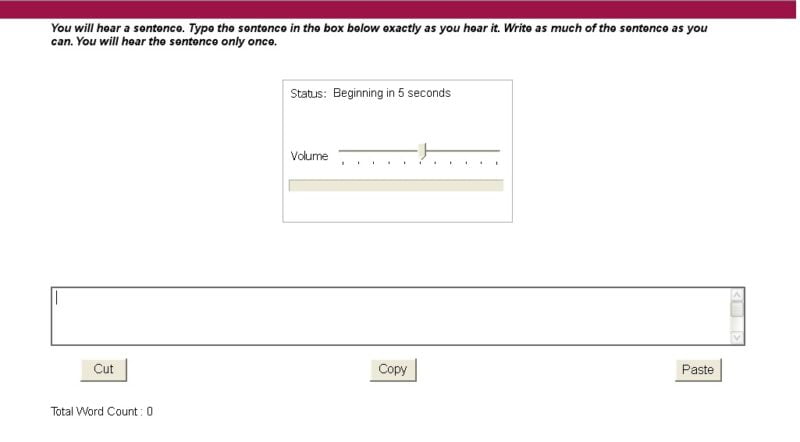
The Write from Dictation task is one of the most critical parts of the PTE Academic exam, located at the end of the Listening section. While it seems straightforward at first glance, this task is deceptively challenging due to the high stakes involved. Each sentence is worth significant points for both listening and writing, and even small mistakes can cost you valuable marks. This blog post will provide a comprehensive guide to understanding, preparing for, and mastering this question type.
What is Write from Dictation in PTE?
In the Write from Dictation task, you will hear a short sentence, usually ranging from 8 to 14 words. Your task is to type the exact sentence you hear. The focus is on accuracy in terms of spelling, word order, grammar, and punctuation. This means that every detail matters, from the placement of commas to the capitalization of the first word.
You will typically encounter three to four Write from Dictation questions at the end of the Listening section, but the number may vary. The sentences are played only once, so you need to stay attentive and ready to type or take notes immediately.
Why is Write from Dictation Important?
Write from Dictation is important because:
1. High Scoring Potential: This task contributes significantly to your overall score in the Listening and Writing sections. Each correctly spelled word gives you marks, so it’s an opportunity to earn full points with a bit of practice.
2. Last Task in the Listening Section: Many students are mentally fatigued by the time they reach this task. This makes it essential to stay focused to maximize your score.
3. Real-life Skills: This task tests your ability to comprehend and reproduce spoken English accurately—a vital skill for academic and professional environments.

How Are Write from Dictation Tasks Scored?
The scoring for Write from Dictation is partial credit, which means you are awarded points for every correctly spelled and sequenced word. For example:
• If the sentence is “The university offers numerous programs for international students” and you type “The university offers numerous programs for students,” you will still get credit for the correct words you wrote.
The trick
There is no penalty if you add extra words in your response. Therefore, aiming for perfect reproduction of the sentence is not essential. Let me explain:
Let’s assume the sentence you hear is: There is a delay of six seconds in any live broadcast.
The sentence is 11 words long. If you type those 11 words in the same order, you will get the full score for this question. However, do not hesitate to add extra words if you have any doubts or confusion.
Let’s say, you have confusion about whether the second word was “is or was”, the third word was “a or the”, and the sixth word was “second or seconds”. Additionally, let’s say you are unsure whether you heard the words “television” or “program” in the audio. Finally, let’s assume you are confused between the spellings “broadcast” and “brodcast”.
You can type the answer as follows: There is was a the delay of six second seconds in any live television program broadcast brodcast.
You will still get the full score as the answer has all 11 words in the same order. The addition of extra words does not matter.
Do not forget
Three things you should never get wrong are as follows:
- Capital letters or small letters matter for the right answer. Remember to always use a capital letter to start the sentence. In the middle of the sentence, use capital letters to start proper nouns like the names of people or places. If unsure, type two variations of the same word – one in capital and the other in small.
- The last word should always be followed by a full stop or a period with a space.
- Do not use any other punctuation marks like a comma or a question mark. There are hardly any questions that require them.
Common Challenges in Write from Dictation
1. Memory Retention: It can be hard to remember the entire sentence after hearing it only once.
2. Speed of Typing: Typing or writing too slowly may lead to missing words.
3. Misheard Words: Accents, homophones, and similar-sounding words can cause confusion.
4. Spelling and Grammar Mistakes: Errors in spelling, punctuation, or word order can reduce your score.
Proven Strategies to Ace Write from Dictation
1. Develop Your Listening Skills
• Practice active listening by regularly listening to podcasts, audiobooks, and English news.
• Focus on distinguishing between similar-sounding words and picking out key information from sentences.
2. Use Note-Taking Techniques
• Write down keywords, initials, or abbreviations as soon as you hear the sentence.
• For example, for “The new library opens on Monday for students,” jot down: NL opens Mon for sts.
• Quickly expand your notes into the full sentence before typing your final answer.
3. Improve Typing Speed and Accuracy
• Fast and accurate typing is essential to reproduce the sentence correctly within the time limit.
• Use online typing tools to practice speed while maintaining focus on grammar and punctuation.
4. Pay Attention to Punctuation
• Always capitalize the first letter of the sentence.
• While punctuation isn’t explicitly scored, omitting a full stop or comma could make your response look less polished.
5. Practice Dictation
• Record yourself reading sentences aloud, then replay them and transcribe what you hear.
• Use free resources like YouTube or dictation apps to find additional practice material.
6. Master Common Sentence Patterns
• PTE often uses sentences with predictable structures. Familiarize yourself with academic-style language, such as:
• “The university will hold a seminar on climate change next week.”
• “Attendance at the lecture is mandatory for all students.”
7. Stay Calm and Focused
• Avoid overthinking the sentence while it is being played. Focus entirely on comprehension and note-taking.

What to Do If You Miss a Word?
Sometimes, you might miss a word or feel unsure about part of the sentence. In such cases:
1. Don’t Leave Blanks: Write what you remember, even if it’s incomplete. You may still score partial credit.
2. Use Contextual Guessing: Based on the meaning of the sentence, fill in the blanks with logical words. For example, if you hear “The experiment was conducted … methods,” adding “using scientific methods” might be a safe guess.
3. Add extra words: Add words or phrases to compensate for gaps in your memory.
Tools and Resources to Practice Write from Dictation
1. PTE Practice Platforms: Websites like ApeUni and E2Language offer free and paid practice materials for Write from Dictation.
2. PTE Listening Apps: Apps like PTE Tutorials or PTE Preparation by 79score can provide practice sentences.
3. YouTube Channels: Many educators share Write from Dictation practice sets and strategies on YouTube.
4. Dictation Practice Tools: Websites like Listen and Write and Dictation.io let you practice listening and typing simultaneously.
Final Thoughts
The Write from Dictation task in the PTE Listening section may appear simple, but it requires a combination of strong listening, memory, and writing skills. By focusing on regular practice, honing your note-taking techniques, and staying calm under pressure, you can confidently tackle this task and maximize your score.
Remember, every word counts! Dedicate time to mastering Write from Dictation, and you’ll be rewarded with a significant boost in your overall PTE score.
Gaurav Thapa is an experienced instructor of English as a Foreign Language. He has eight years of experience teaching IELTS and PTE.